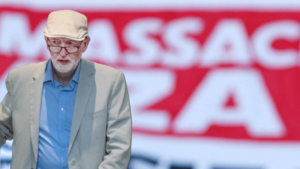Last Wednesday, respected Al Jazeera journalist Shireen Abu Akleh was shot in the head by the Israeli Defence Force, while reporting on one of its military operations.
The outrage has been widespread, to the point that even Labour Party MPs associated with Labour Friends of Israel have felt compelled – if sometimes belatedly – to condemn her killing. Tragically, this high-profile death is one of a great many killings of Palestinian civilians regularly perpetrated by the IDF. The individual crime is an expression of a wider culture of cruelty and oppression that characterises life in the apartheid state and its occupied territories.
‘Systemic brutalisation’
Mainstream politicians and media will likely present this as an individual outrage rather than the product of systemic brutalisation it really is, and Israel’s militarism will continue to be exported to other domains of the Anglo-Saxon Empire for some time yet.
The illegal military occupation of Palestine by Israel has not only blighted the lives of Palestinians for decades; the development of a security state around the occupation has built up a culture of militarism within Israel itself, which – as we have seen with regards to IDF interrogation techniques – is then exported abroad to allied states who are looking to find novel ways of imposing “law and order” on their peoples.
In the UK, for instance, the manufacture of weapons to be sold for use in the slaughter of Palestinians increases the reliance of our own economy on arms production. In certain parts of the country, the war industry is relied upon to provide employment. This, in turn, influences the priorities of politicians representing those constituencies, as well as trade unions, and incentivises the further consolidation of UK manufacturing around weapons for export. Israel is not a lone actor but an integral part of an Empire that spans the “West” and it therefore has the full support of the USA/UK global military-industrial complex, into which it is integrated and according to whose colonial practices the apartheid state is itself modelled.
The IHRA ‘definition’ and the freedom to criticise
The freedom to meaningfully criticise Israel is therefore essential to not only bring about the liberation of Palestine but also the introduction of meaningful change to the peoples of Israel and the UK as well; we are all subjects of the same empire. If follows, then, that, if socialists in the UK are to make progress and restore a measure of democracy to our nation, we must be free to criticise all actors within the Empire’s military and financial complex. To refrain from scrutinising Israel prevents us from seeing the truth about the Empire as a whole and the way it functions, impeding our ability to challenge it; we cannot defeat what we don’t properly understand. Moreover, if socialists will not even seek to win an argument when the facts support their point of view, such as the question of whether Israel is an apartheid state, they can defend nothing at all, let alone advance.
This is one reason why Labour’s adoption of the IHRA definition of antisemitism, and all of its clarifying examples in 2018 was such a disastrous mistake by the party’s left. It is also why Jeremy Corbyn’s decision not to retract the comments he made upon the release of the EHRC report in 2020 marked a significant line in the sand.
To be clear, the IHRA examples do inhibit criticism of Israel and this is explicit: “claiming that the existence of a State of Israel is a racist endeavour” can be considered antisemitic under the IHRA definition.

